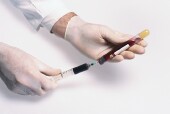
WEDNESDAY, Nov. 28 (HealthDay News) — A new study raises the possibility of a DNA-based blood test that doctors could routinely use to determine whether a patient has cancer.
There are many caveats. The research is preliminary, and the test is not cheap. Even if it does detect cancer, the test — like the one currently used to detect prostate cancer — could raise big questions about how to deal with the results.
Even so, a genetic test for cancer would be a major advance, experts say.
“This would be a way of detecting cancers earlier, and to tell you the level of cancer as you’re going through the therapy,” said Dr. Victor Velculescu, co-director of the Cancer Biology Program at Johns Hopkins Kimmel Cancer Center in Baltimore.
Several blood tests detect the body’s reaction to cancer, and others are being developed, including one that may spot stray cancer cells in the blood. This test is unique because it examines the blood for signs of DNA that’s spilled out of cancerous cells into the bloodstream when they die, Velculescu explained.
In the study, researchers found that the test picked up differences in 10 patients with breast or colorectal cancer when compared to 10 healthy patients. The test didn’t falsely suggest any of the healthy patients had cancer, he added.
“We’re looking at the entire genome and can apply the test to any cancer type or individual cancer,” Velculescu said.
The test costs thousands of dollars, but Velculescu expects the price would eventually drop.
In the future, he said, the test could be performed at regular intervals and detect cancer without requiring a biopsy. For now, however, the test needs to undergo more research.
There’s one possible complication: If the test detects signs of cancer, then what? A blood screening test for prostate cancer, known as the PSA test, is a topic of hot debate because some patients may undergo unnecessary treatment.
Still, Dr. Otis Brawley, chief medical officer and executive vice president of the American Cancer Society, said he can foresee a cancer screening blood test becoming a routine part of medicine, although it may take 20 years or more to get there.
In some cases, Brawley said, doctors could potentially choose to use the screening test to evaluate the extent of cancer in a patient instead of performing a biopsy. For example, in certain types of lung cancer, a biopsy can be dangerous because a needle is inserted into the lung, he noted.
For now, Brawley said, the test is “extremely expensive and extremely preliminary, and it’s probably several years before anybody’s going to be able to buy this.”
The study appears in the Nov. 28 issue of the journal Science Translational Medicine.
More information
For more about cancer, visit the U.S. National Library of Medicine.

